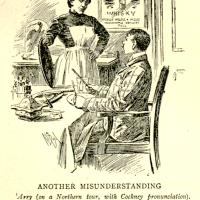For today’s Feature Friday, how about rediscovery of a lost world? Michelle Joelle, student, writer, and blogger, has been posting a “Mini-Syllabus” every now and then. I enjoy each one. Here is one to learn Anglo-Saxon–the Old English language that we find in Beowulf. It is very connected to Old Icelandic and Old Norwegian and the rest of the Norse mythologies and hero tales. It is something I would like to learn, so I’m folding down this page for the future!
Get Pilgrim Posts in Your Inbox
Join 5,304 other subscribers

Connect & Follow!
Like us on Facebook
-
Recent Posts
- Upcoming Ursula K. Le Guin Course at Signum University: Recall John Garth, Maximilian Hart, Kris Swank, and Myself on Ursula K. Le Guin, Language, Tolkien, and World-building (Friday Feature)
- “To rail is the sad privilege of the loser”: C.S. Lewis and the Future of our Words
- The New York C.S. Lewis Society Student Essay Contest
- Shadowy Steps through Hellish Fog: Amy Baik Lee’s Refreshing Invitation in This Homeward Ache
- C.S. Lewis and the Total Eclipse of the Heavens, with An Unauthorized Book-Jacket Description of The Great Divorce
- “The Hateful Feeling of Breathlessness I Have Had for Years”: A Personal Note on the One-Thing-After-Anotherness of Life
- Wyrdhoard Workshop #1: Layering Significance (Writing Workshop Announcement)
- A Brace of Tolkien Posts for his 132nd Birthday (#TolkienBirthdayToast)
Most Popular Posts
Archives
- April 2024
- February 2024
- January 2024
- December 2023
- November 2023
- October 2023
- September 2023
- August 2023
- July 2023
- June 2023
- May 2023
- March 2023
- January 2023
- December 2022
- November 2022
- October 2022
- September 2022
- August 2022
- July 2022
- June 2022
- May 2022
- April 2022
- March 2022
- February 2022
- January 2022
- December 2021
- November 2021
- October 2021
- September 2021
- August 2021
- July 2021
- June 2021
- May 2021
- April 2021
- March 2021
- February 2021
- January 2021
- December 2020
- November 2020
- October 2020
- September 2020
- August 2020
- July 2020
- June 2020
- May 2020
- April 2020
- March 2020
- February 2020
- January 2020
- December 2019
- November 2019
- October 2019
- September 2019
- August 2019
- July 2019
- June 2019
- May 2019
- April 2019
- March 2019
- February 2019
- January 2019
- December 2018
- November 2018
- October 2018
- September 2018
- August 2018
- July 2018
- June 2018
- May 2018
- April 2018
- March 2018
- February 2018
- January 2018
- December 2017
- November 2017
- October 2017
- September 2017
- August 2017
- July 2017
- June 2017
- May 2017
- April 2017
- March 2017
- February 2017
- January 2017
- December 2016
- November 2016
- October 2016
- September 2016
- August 2016
- July 2016
- June 2016
- May 2016
- April 2016
- March 2016
- February 2016
- January 2016
- December 2015
- November 2015
- October 2015
- September 2015
- August 2015
- July 2015
- June 2015
- May 2015
- April 2015
- March 2015
- February 2015
- January 2015
- December 2014
- November 2014
- October 2014
- September 2014
- August 2014
- July 2014
- June 2014
- May 2014
- April 2014
- March 2014
- February 2014
- January 2014
- December 2013
- November 2013
- October 2013
- September 2013
- August 2013
- July 2013
- June 2013
- May 2013
- April 2013
- March 2013
- February 2013
- January 2013
- December 2012
- November 2012
- October 2012
- September 2012
- August 2012
- July 2012
- June 2012
- May 2012
- April 2012
- March 2012
- February 2012
- January 2012
- December 2011
- November 2011
- October 2011
- September 2011
- August 2011
Tags
- Anne of Green Gables
- art
- books
- C.S. Lewis
- Charles Williams
- children's literature
- Collected Letters of C.S. Lewis
- Death
- Dorothy L. Sayers
- fantasy
- film adaptation
- George MacDonald
- Harry Potter
- Inklings
- J.K. Rowling
- J.R.R. Tolkien
- Joy Davidman
- L.M. Montgomery
- letters
- lion the witch and the wardrobe
- literature
- Lord of the Rings
- Lucy Maud Montgomery
- Madeleine L'Engle
- myth
- Narnia
- On Writing
- owen barfield
- Oxford
- Peter Jackson
- Poetry
- Prince Edward Island
- Ransom Trilogy
- Reading
- research
- Science Fiction
- Signum University
- Stephen King
- Surprised by Joy
- Teaching
- That Hideous Strength
- The Great Divorce
- The Hobbit
- theology
- Theology of Culture
- The Screwtape Letters
- Walter Hooper
- writing
- WWI
- WWII
Meta
Categories
- 10 Minute Book Talk
- 5 Books Series
- Blogging the Hugos
- Canadian literature
- Creative Writing
- Feature Friday
- Fictional Worlds
- Guest Blogs
- Inklings and Arthur
- L.M. Montgomery
- Letters
- Lewis Biography
- Lewis' Essays
- Memorable Quotes
- News & Links
- On Writing
- Original Research
- Reflections
- Reviews
- Studies in Words
- The C.S. Lewis Studies Series
- The MaudCast
- Thoughtful Essays
- Throwback Thursdays
Goodreads
Blog Stats
- 1,971,186 visitors to A Pilgrim in Narnia




















I love me my Beowulf. Enjoy!
¿Posible lectura? ¿Qué te parece?
A.
> El 2 oct 2015, a las 19:11, A Pilgrim in Narnia escribió: > > >
Awesome, thanks for sharing! I love listening to people speak Saxon….it’s so familiar and so strange, all at once.
Yeah, it is kind of neat. At Mythcon they chanted the first 50 lines of Beowulf–memorized! I feel like I almost have the words… but then I don’t.
I am reading aloud to my son Simon Armitage’s translation of the Middle English Morte Darthur. On the left page is the old version, on the right the alliterative translation. We are getting good at reading the old version. Clever idea.
Old Saxon, I mean. In other words, Old English….well, I’m sure you get my drift…
Pingback: The Lost-But-Found Works of C.S. Lewis | A Pilgrim in Narnia
Pingback: A Brace of Tolkien Posts (125th Birthday Week) | A Pilgrim in Narnia
Pingback: A Brace of Tolkien Posts #TolkienReadingDay | A Pilgrim in Narnia
Pingback: Infodump and Identification: Thinking about Fantastic First Pages with Anne McCaffrey | A Pilgrim in Narnia
Pingback: A Brace of Tolkien Posts for his 126th Birthday #TolkienBirthdayToast | A Pilgrim in Narnia
Pingback: John Donne’s “The Flea” on Hallowe’en | A Pilgrim in Narnia
Pingback: A Brace of Tolkien Posts for his 128th Birthday #TolkienBirthdayToast | A Pilgrim in Narnia
Pingback: A Brace of Tolkien Posts for his 129th Birthday #TolkienBirthdayToast | A Pilgrim in Narnia
Pingback: A Brace of Tolkien Posts for his 130th Birthday (#TolkienBirthdayToast) | A Pilgrim in Narnia
Pingback: 2021: A Year of Reading: The Nerd Bit, with Charts | A Pilgrim in Narnia